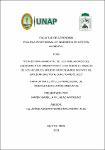| dc.contributor.advisor | Flores Malaverry, Jorge Agustín | |
| dc.contributor.author | Villalaz Fartolino, Karen Isabella | |
| dc.date.accessioned | 2023-10-05T19:10:48Z | |
| dc.date.available | 2023-10-05T19:10:48Z | |
| dc.date.issued | 2023 | |
| dc.identifier.other | 333.72 V66 2023 | |
| dc.identifier.uri | https://hdl.handle.net/20.500.12737/9381 | |
| dc.description.abstract | The general objective of the study presented was to know the perception of the residents on the topic already stated. It concerns a descriptive thesis and simple design. A sample of 124 people over 18 years of age who reside in the AAHH was considered. A survey was applied to collect data. The work reached the following conclusions: we worked with people who live in the community for more than 31 years and maintain 4 to 6 family members in their homes, interviewing men (66%) and women (44%), having as their main occupation , merchants, drivers, housewives, day laborers, etc. Regarding internalized environmental knowledge or personal knowledge about environmental problems and the environment, they refer that the environment is a set of factors such as water, air, soil, biodiversity and cultural elements that form the natural environment. Environmental problems affect these resources or the environment, such as the felling of forests alters the resource (72.6%), the growth of the vehicle fleet (80.6%), wastewater also (100%), the production of electrical energy 100% and the exploitation of hydrocarbons (88.7%). Regarding solid waste management, they stated that garbage is something that is thrown away and has no other use (40%), they deposit their waste in plastic bags (30%) and cardboard boxes (28.6%). There is no waste management in the homes (80%), it is only deposited and delivered to the RRSS collection units. They believe that poor municipal management causes waste pollution to occur in the community. They did not receive training on any topic in solid waste (100%) and 75.8% do not know what waste segregation means. They recognize organic waste (that decomposes, food remains) and inorganic waste (PETT plastics). They are willing to train in environmental issues, to have a healthy and harmonious environment. | en_US |
| dc.description.abstract | El estudio presentado tuvo como objetivo general, conocer la percepción de los pobladores sobre el tema ya enunciado. Atañe a una tesis descriptiva y diseño simple. Se considero una muestra de 124 personas mayores de 18 años que residen en el AAHH. Se aplicó una encuesta, para la colección de datos. El trabajo llego a las siguientes conclusiones: se trabajo con personas que viven en la comunidad mas de 31 años y mantiene en sus casas de 4 a 6 familiares, entrevistándose a hombres (66%) y mujeres (44%), teniendo como ocupación principal, comerciantes, choferes, amas de casa, jornaleros, etc. Sobre el conocimiento ambiental interiorizado o conocimiento personal sobre problemas ambientales y el ambiente, refieren que ambiente es un conjunto de factores como agua, aire, suelo, biodiversidad y elementos culturales que forman el entorno natural. Los problemas ambientales afectan a estos recursos o al ambiente, como la tala de bosques altera el recurso (72.6%), el crecimiento del parque automotor (80.6%), las aguas servidas igualmente (100%), la producción de energía eléctrica 100% y la explotación de hidrocarburos (88.7%). Sobre la gestión de residuos sólidos, manifestaron que basura es algo que se desecha y no tiene otro uso (40%), depositan sus residuos en bolsas plásticas (30%) y cajas de cartón (28.6%). No hay ningún manejo de los residuos en las viviendas (80%), solo se depositan los mismos y se entregan a las unidades recolectoras de RRSS. Opinan que la mala gestión de municipio hace que ocurra contaminación por residuos en la comunidad. No recibieron capacitación sobre ningún tema en residuos sólidos (100%) y el 75.8% no sabe que es segregar residuos. Reconocen residuo orgánico (que se descompone, restos de comida) e inorgánicos (plásticas PETT). Están dispuestos a capacitarse en temas ambientales, para tener un ambiente sano y armónico. | es_PE |
| dc.format | application/pdf | es_PE |
| dc.language.iso | spa | es_PE |
| dc.publisher | Universidad Nacional de la Amazonía Peruana | es_PE |
| dc.rights | info:eu-repo/semantics/openAccess | * |
| dc.rights.uri | https://creativecommons.org/licenses/by/4.0/ | * |
| dc.subject | Gestión ambiental | es_PE |
| dc.subject | Desechos sólidos | es_PE |
| dc.subject | Contaminación ambiental | es_PE |
| dc.subject | Calidad de vida | es_PE |
| dc.subject | Entorno sociocultural | es_PE |
| dc.title | Percepción ambiental de los pobladores del asentamiento humano Monte Sion sobre el manejo de los residuos sólidos domiciliarios distrito de San Juan Bautista, Loreto–Perú,2021 | es_PE |
| dc.type | info:eu-repo/semantics/bachelorThesis | es_PE |
| thesis.degree.discipline | Ingeniería en Gestión Ambiental | es_PE |
| thesis.degree.grantor | Universidad Nacional de la Amazonía Peruana. Facultad de Agronomía | es_PE |
| thesis.degree.name | Ingeniero(a) en Gestión Ambiental | es_PE |
| dc.subject.ocde | https://purl.org/pe-repo/ocde/ford#1.05.08 | es_PE |
| renati.author.dni | 73672511 | |
| renati.advisor.orcid | https://orcid.org/0000-0002-1125-8600 | |
| renati.advisor.dni | 05203391 | |
| renati.type | https://purl.org/pe-repo/renati/type#tesis | es_PE |
| renati.discipline | 521236 | es_PE |
| renati.level | https://purl.org/pe-repo/renati/level#tituloProfesional | es_PE |
| renati.juror | Yalta Vega, Ronald | |
| renati.juror | Chavez Vasquez, Rafael | |
| renati.juror | Avila Fucos, Manuel Calixto | |
| dc.publisher.country | PE | es_PE |





